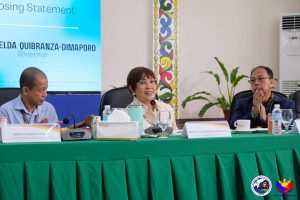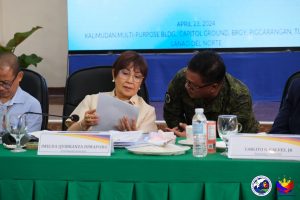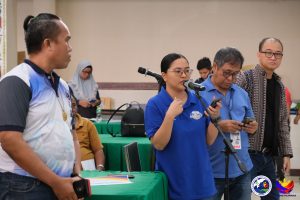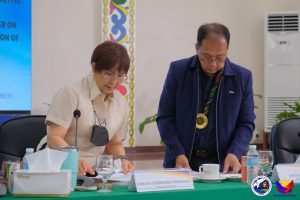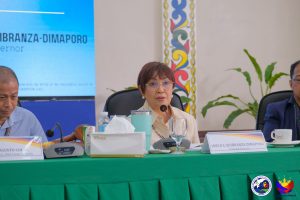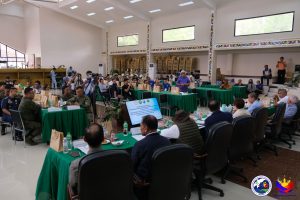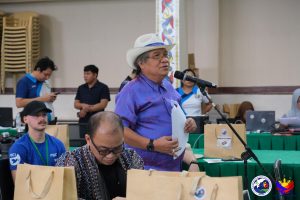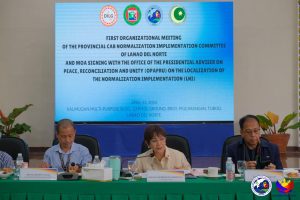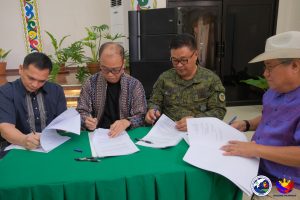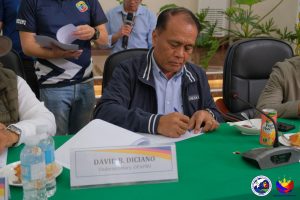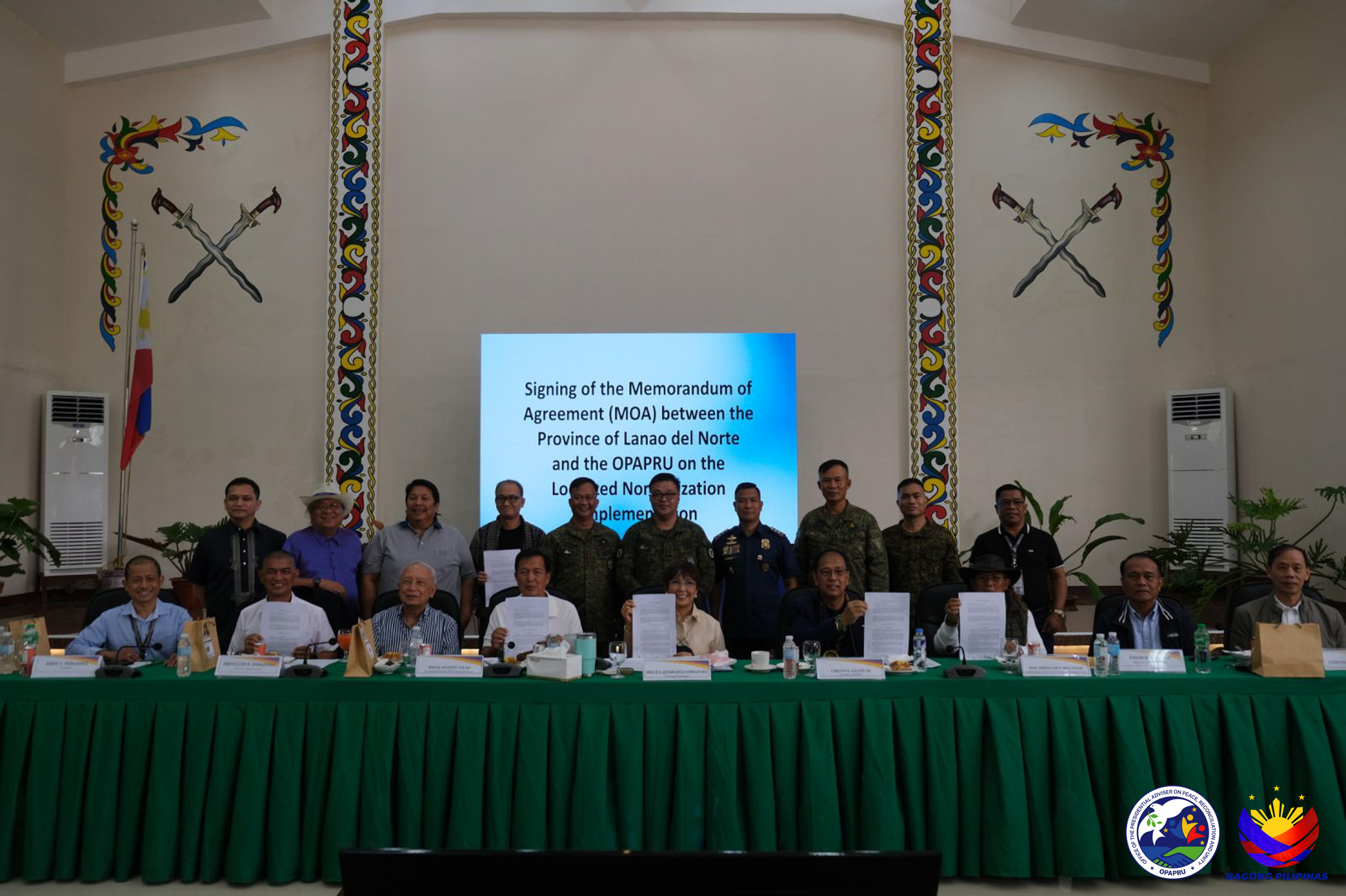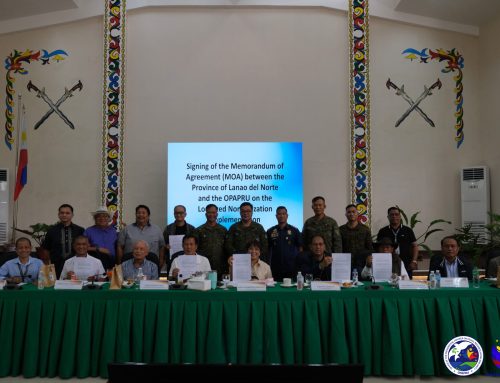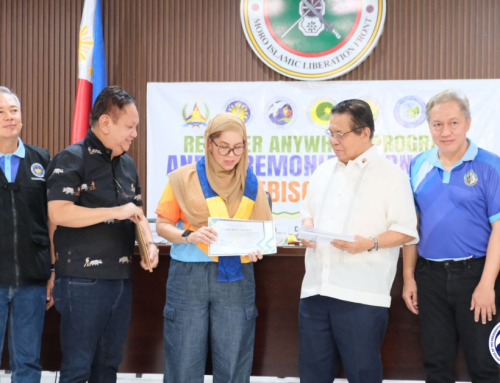TUBOD, LANAO DEL NORTE — Local government units (LGUs) will now be at the forefront in the implementation of the Normalization Program for decommissioned Moro Islamic Liberation Front (MILF) combatants and communities.
This developed as the Provincial Government of Lanao del Norte, led by Governor Imelda Quibranza-Dimaporo, and the Office of the Presidential Adviser on Peace, Reconciliation and Unity (OPAPRU), headed by Presidential Peace Adviser, Secretary Carlito G. Galvez Jr., signed a Memorandum of Agreement (MOA) to jointly implement the “Localizing Normalization Implementation” (LNI) Program on Tuesday, April 23.
The cross-cutting initiative, which aims to uplift the lives of MILF members, their families and communities, is designed to adapt to broader peace and normalization efforts, as well as the socioeconomic conditions in Lanao del Norte.
The LNI also seeks to build a shared commitment to fostering genuine development and long-lasting peace by addressing critical areas such as security enhancement, socio-economic growth, livelihood enhancement, political participation, confidence-building measures, and transitional justice and reconciliation.
The children will benefit
Dimaporo, who presided over a meeting between the Lanao del Norte PLGU and OPAPRU, expressed enthusiasm about the agreement, noting that the MOA signing marks a significant step for the province towards achieving sustainable peace and prosperity.
“I am very emotional today kasi nga finally, nasagot na rin ng Diyos at nagkaroon ng tiwala si Hon. Member of the Parliament Commander Bravo (Abdullah Macapaar) sa ating gobyerno. And finally, ito na nga po, we are now together for a more peaceful province that all the children, ‘yung mga lahat ng anak natin, the children of our children, will benefit,” she said.
This OPAPRU-Lanao del Norte PLGU partnership stems from a commitment made on March 27, 2024, wherein the provincial government established an LNI Committee following the issuance of an Executive Order during Lanao del Norte’s 1st Quarter Provincial Peace and Order Council (PPOC) and Provincial Anti-Drug Abuse Council (PADAC) meetings.
“I am really overwhelmed that nangyari na po ito. And I know this is going to be the start…[ng] tunay na pagsasama where the people of Lanao del Norte will be united — the Muslims and the Christians,” Dimaporo stressed.
Increased LGU ownership, accountability
According to Ariel Hernandez, the chairperson of the GPH-Joint Normalization Committee and socioeconomic cluster head of the Inter-Cabinet Cluster Mechanism on Normalization, the LNI will focus more on the “provincial setting” wherein the governor will be at the forefront of the initiative’s implementation.
Under this new framework, LGUs in Lanao del Norte will take the lead in executing normalization and transformation projects, tailoring interventions to meet the specific needs and situations in their respective communities.
This approach ensures the direct involvement and ownership of LGUs in the peacebuilding processes.
A joint secretariat, composed of representatives from the provincial government, the Armed Forces of the Philippines, civil society groups, religious sector, non-governmental organizations, academe and other local stakeholders, will help oversee the LNI’s implementation.
This collaborative structure aims to harness the synergy of all sectors at the provincial level to drive effective and sustainable outcomes at the grassroots level.
The LNI is designed to support the overarching goals of the Comprehensive Agreement on the Bangsamoro (CAB), the landmark peace agreement signed in 2014 between the government and the MILF.
The CAB seeks to address the decades-long armed conflict in Mindanao by fostering a community-driven approach that promotes inclusivity, accountability, and sustainability.
With the LNI, Hernandez pointed out that LGUs will own the projects under the normalization and transformation programs.
Related interventions will be adjusted to adapt to the local setting, harvesting the synergy of all sectors in the province, with the various peace partners working closely with MILF and Moro National Liberation Front (MNLF) members.
Everyone is part of the process
According to Galvez, the success of the LNI is anchored on the “continued support and cooperation from all stakeholders.”
“The collaborative mechanism of the LNI-LDN will ensure that everyone is part of the planning, decision-making and implementation process of the Normalization Program. This multi-stakeholder approach, which is anchored on the principle of consensus-building, is essential for the success and sustainability of our efforts,” he said in his message during the ceremonial signing of the MOA.
Galvez said the identified priority programs under the LNI include infrastructure projects that are aligned with the priorities and strategic thrusts of the BARMM and national government agencies.
“As we move forward with the LNI, we must remember that it is designed to support and reinforce the Normalization Program for our Moro Islamic Liberation Front (MILF) brothers and sisters. All our interventions under the LNI must, therefore, adapt to the specific capacities and needs of each community, emphasizing the importance of instilling local ownership and accountability,” the peace adviser underscored.
To date, the provinces of Basilan and Lanao del Norte have already given their full support and signed a MOA with OPARU to formalize their partnership in the implementation of the LNI.
“The LNI program was piloted in Basilan, marking a significant milestone for the province. The priority programs of LNI-Basilan include the Small Arms and Weapons (SALW) Program and different socioeconomic development interventions, which seek to promote peace, development and stability in the region,” Galvez said. ###
